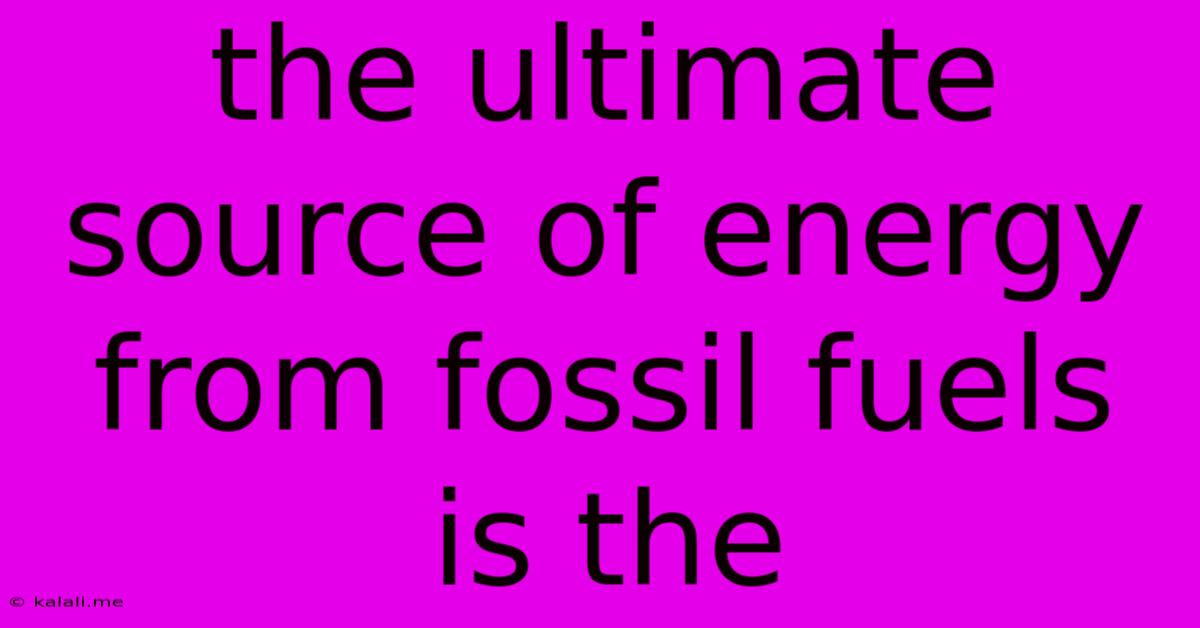The Ultimate Source Of Energy From Fossil Fuels Is The
Kalali
Jun 15, 2025 · 3 min read

Table of Contents
The Ultimate Source of Energy from Fossil Fuels is the Sun
The energy we derive from fossil fuels – coal, oil, and natural gas – might seem like a mysterious, Earth-bound power source. But the truth is far more fascinating and ultimately points to a single, celestial origin: the sun. This article will delve into the incredible journey of solar energy, from its creation in the sun's core to its eventual release as the energy that powers our modern world.
Fossil fuels are essentially stored solar energy. They represent the fossilized remains of ancient plants and microorganisms. These organisms, during their lifetime, harnessed the sun's energy through photosynthesis. This complex process converts sunlight, water, and carbon dioxide into chemical energy in the form of sugars. These sugars formed the building blocks of the organisms' bodies.
Over millions of years, immense pressure and heat deep within the Earth transformed these organic remains into the fossil fuels we utilize today. The energy inherent in these fuels, therefore, is a direct consequence of the sun's energy captured long ago. Let's break it down further:
The Photosynthesis Process: Capturing Solar Energy
Photosynthesis is the cornerstone of this entire energy chain. Through a series of intricate chemical reactions, plants and algae absorb sunlight using chlorophyll, a green pigment. This absorbed sunlight is used to split water molecules, releasing oxygen and providing the energy to convert carbon dioxide into sugars (glucose). This process essentially traps solar energy within the chemical bonds of the sugars.
From Ancient Organisms to Fossil Fuels: The Transformation
When these ancient organisms died and sank to the bottom of oceans or swamps, they became buried under layers of sediment. Over vast periods, the immense pressure and heat from the Earth's interior transformed these organic materials. The absence of oxygen during this process prevented complete decomposition, leading to the formation of:
- Coal: Formed from compacted plant matter, primarily from ancient forests and swamps.
- Oil (Petroleum): Formed from the remains of marine organisms, particularly microscopic plankton.
- Natural Gas: Primarily composed of methane, also originating from the decomposition of organic matter.
These fossil fuels now contain the stored solar energy originally captured through photosynthesis, concentrated over millions of years. When we burn these fuels, we are essentially releasing that ancient solar energy in the form of heat and light.
The Implications: A Finite Resource and the Need for Renewable Energy
Understanding the sun's role in creating fossil fuels highlights their finite nature. These fuels represent a non-renewable resource, formed over geological timescales, far exceeding human lifespans. The rate at which we consume fossil fuels far surpasses the rate at which they are naturally replenished. This underscores the crucial need to transition towards renewable energy sources, like solar, wind, and hydroelectric power – sources that directly harness the sun's energy or other readily replenishable natural forces. These sources provide a sustainable pathway to meet our energy needs without depleting the Earth's precious reserves of stored solar energy. The ultimate source of energy remains the sun, and leveraging its power directly offers a more sustainable future.
Latest Posts
Latest Posts
-
What Is The Antonym For Abundant
Jun 15, 2025
-
Which Of The Following Combinations Are Correctly Matched
Jun 15, 2025
-
In The Two Dimensional Body Illustrated The Gradient At Surface A
Jun 15, 2025
-
Movement Of A Limb Toward The Midline Of The Body
Jun 15, 2025
-
What Element Is Found In Proteins
Jun 15, 2025
Related Post
Thank you for visiting our website which covers about The Ultimate Source Of Energy From Fossil Fuels Is The . We hope the information provided has been useful to you. Feel free to contact us if you have any questions or need further assistance. See you next time and don't miss to bookmark.